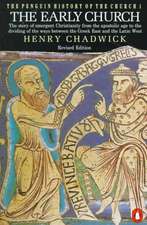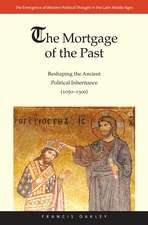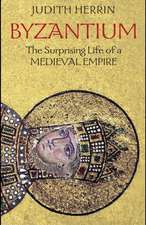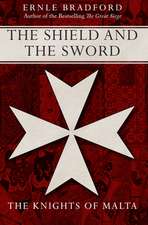The End of Byzantium
Autor Jonathan Harrisen Limba Engleză Paperback – 12 iul 2012
Preț: 335.53 lei
Nou
Puncte Express: 503
Preț estimativ în valută:
64.22€ • 67.74$ • 53.51£
64.22€ • 67.74$ • 53.51£
Carte tipărită la comandă
Livrare economică 03-17 ianuarie 25
Preluare comenzi: 021 569.72.76
Specificații
ISBN-13: 9780300187915
ISBN-10: 0300187912
Pagini: 336
Ilustrații: 16 b-w illus.
Dimensiuni: 127 x 197 x 22 mm
Greutate: 0.36 kg
Editura: Yale University Press
ISBN-10: 0300187912
Pagini: 336
Ilustrații: 16 b-w illus.
Dimensiuni: 127 x 197 x 22 mm
Greutate: 0.36 kg
Editura: Yale University Press
Notă biografică
Jonathan Harris is professor of the history of Byzantium at Royal Holloway, University of London.
Recenzii
'Harris interrogates the evidence sensitively … showing how the realities of power in the Eastern Mediterranean rendered simple notions of patriotism and heroism irrelevant. … What Harris's lucid narrative demonstrates is that there was no clear East-West, Muslim-Christian split.' - Times Literary Supplement
“Harris offers plenty of serious scholarship, and a useful amount of background.”—John Hinton, Catholic Herald
"Lucid; extremely well written with an excellent array of quotes and spread of information."—Michael Angold, Reviews In History
"Harris is fully in command of this Islamic conquest and records a saga seething with treachery and avarice with rich political overtones and giant cannonades. Christendom is at flashpoint in this scholarly journey into a barbaric age."—Colin Gardner, Oxford Times
“A remarkable book, which offers numerous fresh insights and weaves a gripping and deeply moving story that constantly startles us with its newness, its originality, and its balance. Byzantines, Turks, Latins - Harris breathes new life into these long-dead characters and makes us understand both their choices and the circumstances that led them to make those choices. This is history as it should be written - an epic tale that rouses our imaginations and captures our sympathies as effectively as it explains and informs.” - Colin Wells, author of Sailing from Byzantium
"Jonathan Harris's new account of the fall of Constantinople in 1453 is a welcome and highly readable treatment of one of the most important events in world history. The author knows his sources inside out and his book is a fine work of scholarship. But he also handles his subject with narrative momentum and descriptive flair, and he never loses sight of the humanity involved in these twilight years of a once-great empire."—Norman Housley, author of Fighting for the Cross
Harris's book tells and oft-told tale in a fresh way.
— Brian G. H. Ditcham, Gillingham, Kent, England“Shows expert knowledge of the Greeks in the west and of cultural trends in humanistic thought. . . . Harris provides a sympathetic reading of the civil wars and conflicts engendered by the empire’s fundamental problem in this era: how to balance Byzantine traditions with the need for military aid from the West in order to confront the Ottoman Turks.”—Judith Herrin, Wall Street Journal
“Western education has given us so little background on the Byzantines that Harris’s thorough study will whet readers’ appetite for more about this intriguing kingdom.”—Publishers Weekly
“The End of Byzantium is a worthy successor to [earlier] books and indeed supersedes them as an introduction to the empire in its final hour. . . . [Harris] explains the unfamiliar without dumbing-down and lets the players speak for themselves.”—Paul Magdalino, American Historical Review









